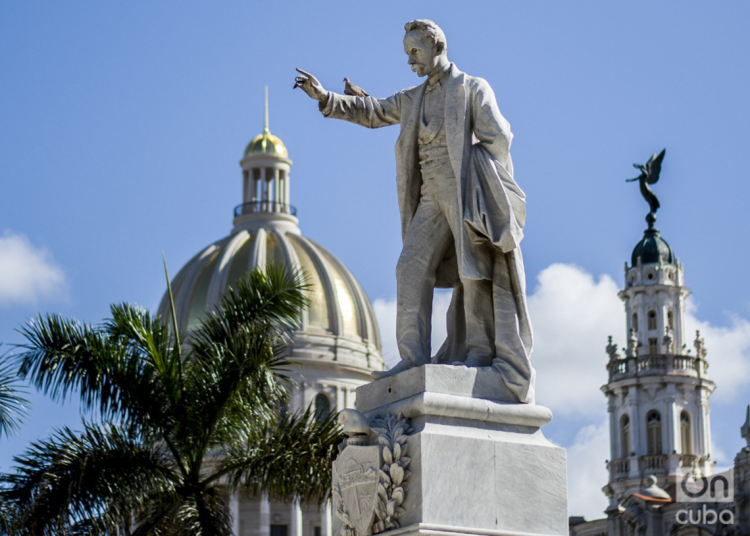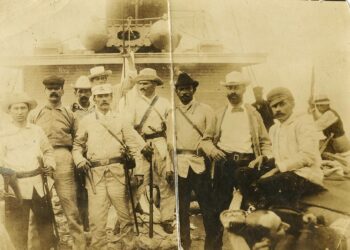Cuban President Miguel Díaz-Canel has just called for “the unity of all Cubans,” for respect among Cubans, and that we strip ourselves of any feelings of hatred.” Given the concrete circumstances of last Sunday, his statement may be very important.
At the same time, three historic days have already been documented in verified videos that will never be erased from our collective memory. Every effort —civic and patriotic— must be made to process the situation in ways that lead to positive solutions, rather than worsen the crisis the nation is undergoing.
Who are the Cuban people?
Article 3 of the Constitution states that the nation’s sovereignty lies in the people (“el pueblo”), “from whom the State’s power emanates.” This text —approved by 86% of voters— requires us to respect popular sovereignty and fundamental rights.
The constitutional “right to resist” may be used against “anyone who attempts to overthrow the political, social, and economic order established by this Constitution, and use any means. Such an extreme measure requires the prior use of other measures before invoking it.
The first step is to seek political solutions to the protests. Next, declare a state of emergency with guarantees of fundamental rights. To skip over these measures and simply claim the “right to resist” is an illegitimate use of this concept, and it would augur a tragic situation for the nation.
Democratic nationalism —inclusive, anti-imperialist, anti-xenophobic— has been a central element of Cuban history up to the present. Its key element is its popular, non-elite content and meaning. The 19th-century slave owners are no longer in Cuban streets today, nor are the oligarchs of 1912, nor the bourgeoisie of 1952.
The people in the streets today are the Cuban people, or part of them, who belong toare part of the Cuban people as much as anyone else, regardless of whether one likes the way they speak, how they act, or how they think. The Cuban people, as a whole, is sovereign. The Cuban state must listen to, respect, and protect the people.
Amid the chaos, Cubans have been called to intervene and participate in the violence
An extremist sector of the Cuban exile community in the United States has called for U.S. intervention. They finance violent acts, deliberately spread fake news, and encourage people to commit arson, loot property, kill police officers, and join the battle, from their cell phone trenches. However this situation works out, and whatever the suffering endured by people in Cuba, those extremists will stay where they are.
That line of thought —which by no means represents all exiles, and much less the Cuban diaspora— will do whatever it takes to achieve its version of an appropriate “ending”. In my opinion, it is absolutely essential to distance ourselves from and oppose that agenda on the part of the Cuban patriotic spectrum, no matter how radical the objections against the State and the conditions on the island.
Under no circumstances does that element explain the entire protests or automatically transmit their agenda to all protesters. It is important to distinguish and separate the instrumental use of these exhortations to civic violence from the current popular demands and issues, and to recognize the spectrum of competing demands.
Intervention itself is absolutely unacceptable, but beyond its real possibility, the mere perception of the threat of intervention encourages a shutdown of all potential internal criticism, reorienting it toward the defense of the nation before an external threat, and justifiably so.
Cuba has major problems with U.S. policies, but it also has its own problems and space must be given to face deal with them.
The United States and the soft coup
President Biden has upheld the previous policies of sanctions, unchanged even in the midst of the most serious phase of the Covid-19 pandemic thus far. The embargo is an affront to the Cuban nation. Strictly colonial in nature, it is a crime against the Cuban people. Biden’s attitude contradicts the very policy he advocated during the Obama Administration, which claimed that new objectives could not be achieved by using the same unsuccessful means.
Anyone who thinks that this situation begins and ends here, or that it can only be explained as a “soft coup” confuses the core of the problem.
The concept of a soft coup has proven a reality in various processes around the world. If there truly are any confirmed agents to that end, they must answer for putting themselves at the service of a foreign power; but not all social protests can be treated as if they were a product of such an endeavor.
The excessive use of this approach carries a great political danger: It leaves no room for the legitimacy of social demands expressed under protest. That understanding can only lead to the repression of all protests. Recognizing the legitimacy of the demands at stake today is a strong blow against any pretense of a soft coup.
What can be done
Several things can and should be done right now. The recommendations I share stem from a sense of urgency and the need to be useful. They are surely insufficient, though not irrelevant.
Immediately stop all police repression against the unarmed population, which has expressed itself peacefully. Contain the violent civil actions taken against people and property, with rules of proportionality and clear lines of responsibility. Prohibit the use of lethal weapons except in the case of imminent fatal danger to any person. Soldiers should not be on the streets in civilian clothing. People should not be called to report to work centers, military service units, etc., to participate in violent acts against protesters.
Likewise, prosecute only people who have committed serious crimes against other people or property, taking into account the seriousness of the consequences and the context in which they occurred. Promise, and guarantee, a review of police actions with consequences for excessive cases. Offer specific information on detainees, withdraw charges for all peaceful protesters, and provide due process for civilians who have committed violent acts with qualifying damages according to the law. Ensure internet service. Facilitate fake-news-verification services. Call for social peace, in the strongest sense, with the expansion and application of rights of participation and expression, such as the right to peaceful demonstration.
I also consider it urgent to advance the legislative plans for all pending laws related to civic and political rights; these should be immediately accelerated and implemented, providing precise information on timetables, as well as measures of popular benefit, such as a boost to nation-wide food-producing initiatives. Long-term investments should be temporarily suspended and reallocated to emergency social plans (measures of this nature have already been announced, but many more are needed). Special social protection measures must be renewed for the most disadvantaged sectors of the population such as the elderly, single-person low-income households, single mothers, and the most impoverished neighborhoods. There should be customs benefits for basic necessities, and the acceleration of the review and acceptance of demands of Cuban emigrants regarding their rights in and pertaining to the country.
Diubis Laurencio Tejeda died in these protests; this has already been established. For years it was oft-repeated that the “first death” would benefit the official U.S. agenda of aggression against Cuba, but in fact, the very revolutionary ethics of life are such that a single death is intolerable, no matter on which “side”, or whomever “benefits” from the death.
Part of these ethics lies in delving into the question of the causes of political outrage and radical hatred that we have seen throughout the country, beyond labels such as the “same-old haters,” or the “habitual mercenaries,” which only serves to stigmatize, cover-up, and reproduce the issues.
To protest peacefully is a right, unlike attacking people or communal property. All revolutionaries have the right to defend their convictions, also peacefully. We don’t need soft coups nor embargos, but we do need democratization. As José Martí once said, “bread and freedom”: like the verse, they are either saved together or are both condemned.
Translated by Erin Goodman










